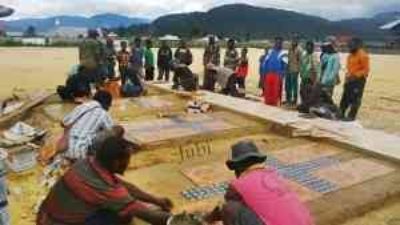Jayapura, Jubi – The families of the victims of the Bloody Paniai human rights violations assessed that the trial of the case at the Makassar Human Rights Court was no more than a publicity stunt by the State.
Rights activist Yones Douw, an advocate for the victims’ families, in a written statement received by Jubi on Thursday, September 15, 2022, said that the victims’ families, survivors and witnesses of the incident refused to attend or testify at the Makassar Human Rights Court this month.
Yones Douw is an advocate for Yosep Degei, Yosep You, Obet Gobai and Herman Yeimo. They are the parents of the four students shot dead by security forces on December 8, 2014, namely Simeon Degei, Pius You, Apinus Oktopia Gobai and Yulius Yeimo. Douw also represents Yermias Kayame, one of the 21 survivors of the Bloody Paniai tragedy.
Douw said the shooting that killed four people and injured 21 people in Enarotali, the capital of Paniai Regency, was a gross human rights violation involving four Indonesian Military (TNI) and Police units. The victims’ families and survivors were disappointed that only one defendant would be tried at the Makassar Human Rights Court.
“The families of victims, witnesses, advocate I and II state to President Joko Widodo, the High Commissioner of the UN Human Rights Council, the Attorney General’s Office, the Papuan Council of Churches, the National Commission on Human Rights [Komnas HAM], the panel of judges of the Makassar Human Rights Court, all national and international human rights institutions, journalists, and religious and Church leaders wherever they are, that we will not attend the Bloody Paniai gross human rights violation trial in Makassar because the suspect being tried is only one retired officer,” said Douw.
Douw assessed that the trial process did not match the facts on the ground. “Indonesia is protecting the perpetrators of the Bloody Paniai gross human rights violation, there is impunity,” said Douw.
Douw emphasized that the families of victims and survivors will not give power of attorney to anyone to represent them to testify at the Makassar Human Rights Court. If there were parties who became witnesses in the trial, Douw said it must have been the trickery of the State and TNI.
“We think the Bloody Paniai trial is just a publicity stunt. It will not resolve the case. In fact, the Court tried the perpetrators according to the wishes of the Indonesian Government, not according to the facts on the ground,” said Douw.
Douw urged President Joko Widodo to conduct a good and true trial for the Bloody Paniai case. “Conduct a good trial that respects us, the families of the victims, or we Papuans, because we are also God’s people,” said Douw.
Amnesty International Indonesia’s report “Suda, Kasih Tinggal Dia Mati – Murder and Impunity in Papua” published in 2018 says that the Bloody Paniai occurred when hundreds of Papuans protested near the local military and police headquarters in Enarotali, as a response to the alleged beating of 11 Papuan children by military personnel on December 7, 2014.
When protesters began throwing rocks and wood around the buildings, security forces fired live ammunition at the crowd, killing four people. At least 11 others were injured by gunfire or bayonets. A number of residents have testified to Komnas HAM that they saw police officers shoot protesters at close range, even after the victim had fallen to the ground.
However, on April 16, 2022, head of the Attorney General’s Office’s Legal Information Center Ketut Sumedana announced that his party handed over only one suspect to be tried at the Makassar Human Rights Court. “The trial of suspect IS in the case of alleged gross human rights violation in the 2014 Bloody Paniai incident will be held at the Makassar Human Rights Court,” Sumedana said at the time.
Head of the Impunity Monitoring Division of the Commission for Missing Persons and Victims of Violence (KontraS) Tioria Pretty assessed that the legal process of the Bloody Paniai case by the AGO was odd as neither the commander nor the field perpetrators were brought to court. Tioria said it was even worse than the legal process of the Bloody Abepura case.
“We consider the legal process in the Bloody Paniai case to be even worse than the legal process in three other cases of human rights violations that have been tried at the Human Rights Court, namely the Bloody Abepura, Tanjung Priok and East Timor cases. Even when the three of them also already showed odd legal process,” Tioria said on July 22, 2022.
Tioria said the ad hoc human rights courts for the Bloody Abepura, Tanjung Priok, and East Timor cases failed to provide justice for the victims and their families. For example, two defendants in the Bloody Abepura case, Brig. Gen. Johny Wainal Usman and Sr. Comr. Daud Sihombing were acquitted by the Makassar Human Rights Court for the Bloody Abepura case on September 8 and 9, 2005.
Meanwhile in the Bloody Paniai trial, IS, a retired TNI officer, became the sole suspect in the case. Tioria questioned IS’s capacity at the time of the shooting. “What exactly was his capacity at the time of the incident? There are other perpetrators that must be brought to court,” Tioria said. (*)













